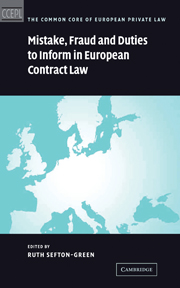Book contents
- Frontmatter
- Contents
- General editors' preface
- Preface
- List of contributors
- Table of legislation
- Table of cases
- List of abbreviations
- 1 General introduction
- 2 Mistake, misrepresentation and precontractual duties to inform: the civil law tradition
- 3 The rise and fall of mistake in the English law of contract
- 4 Case studies
- Case 1 Anatole v. Bob
- Case 2 Célimène v. Damien
- Case 3 Emile v. Far Eastern Delights
- Case 4 Mr and Mrs Timeless v. Mr and Mrs Careless
- Case 5 Bruno v. The Local Garage
- Case 6 Emmanuel v. The Computer Shop
- Case 7 Cinderella
- Case 8 Estella v. Uriah Heep
- Case 9 Nell v. Scrooge Bank
- Case 10 Zachary
- Case 11 Monstrous Inventions Ltd v. Mary Shelley
- Case 12 Lady Windermere v. Angel
- 5 Comparative conclusions
- Index
Case 11 - Monstrous Inventions Ltd v. Mary Shelley
Published online by Cambridge University Press: 06 August 2009
- Frontmatter
- Contents
- General editors' preface
- Preface
- List of contributors
- Table of legislation
- Table of cases
- List of abbreviations
- 1 General introduction
- 2 Mistake, misrepresentation and precontractual duties to inform: the civil law tradition
- 3 The rise and fall of mistake in the English law of contract
- 4 Case studies
- Case 1 Anatole v. Bob
- Case 2 Célimène v. Damien
- Case 3 Emile v. Far Eastern Delights
- Case 4 Mr and Mrs Timeless v. Mr and Mrs Careless
- Case 5 Bruno v. The Local Garage
- Case 6 Emmanuel v. The Computer Shop
- Case 7 Cinderella
- Case 8 Estella v. Uriah Heep
- Case 9 Nell v. Scrooge Bank
- Case 10 Zachary
- Case 11 Monstrous Inventions Ltd v. Mary Shelley
- Case 12 Lady Windermere v. Angel
- 5 Comparative conclusions
- Index
Summary
Case
In order to encourage management staff to retire early, Mr Dracula, managing director of Monstrous Inventions Ltd, sends out an internal memo without informing the personnel department and Mary Shelley, eligible for the proposal, accepts the ‘package’. A settlement is thus concluded. Unknown to both of them, the personnel department was investigating an allegation of Mary's dishonesty, and Mr Dracula was advised the same day that there was sufficient reason to terminate Mary's contract. What remedy, if any, is available?
Discussions
Austria
(i) Although Mr Dracula made a mistake as to the important qualities of the other contracting party (§ 873 ABGB), namely as to her honesty, it is questionable whether Mary had been aware of this mistake at the time of contracting and had taken advantage of this fact and, if so, she was obliged to disclose the true facts to Mr Dracula. Although Mary had probably been aware of her misbehaviour, it cannot be assumed that she was aware of the consequences of the ‘package’. Only fraudulent intention is retained, gross negligence is not sufficient. Even if it is assumed that Mary recognised Mr Dracula's mistake and failed to disclose the proper facts on purpose, her non-disclosure does not amount to fraudulent misleading in the sense of § 870 ABGB. Despite an employee's duty of special loyalty to the employer, the employee has no duty to disclose information to his employer which would lead to his or her dismissal.
- Type
- Chapter
- Information
- Mistake, Fraud and Duties to Inform in European Contract Law , pp. 342 - 354Publisher: Cambridge University PressPrint publication year: 2005



